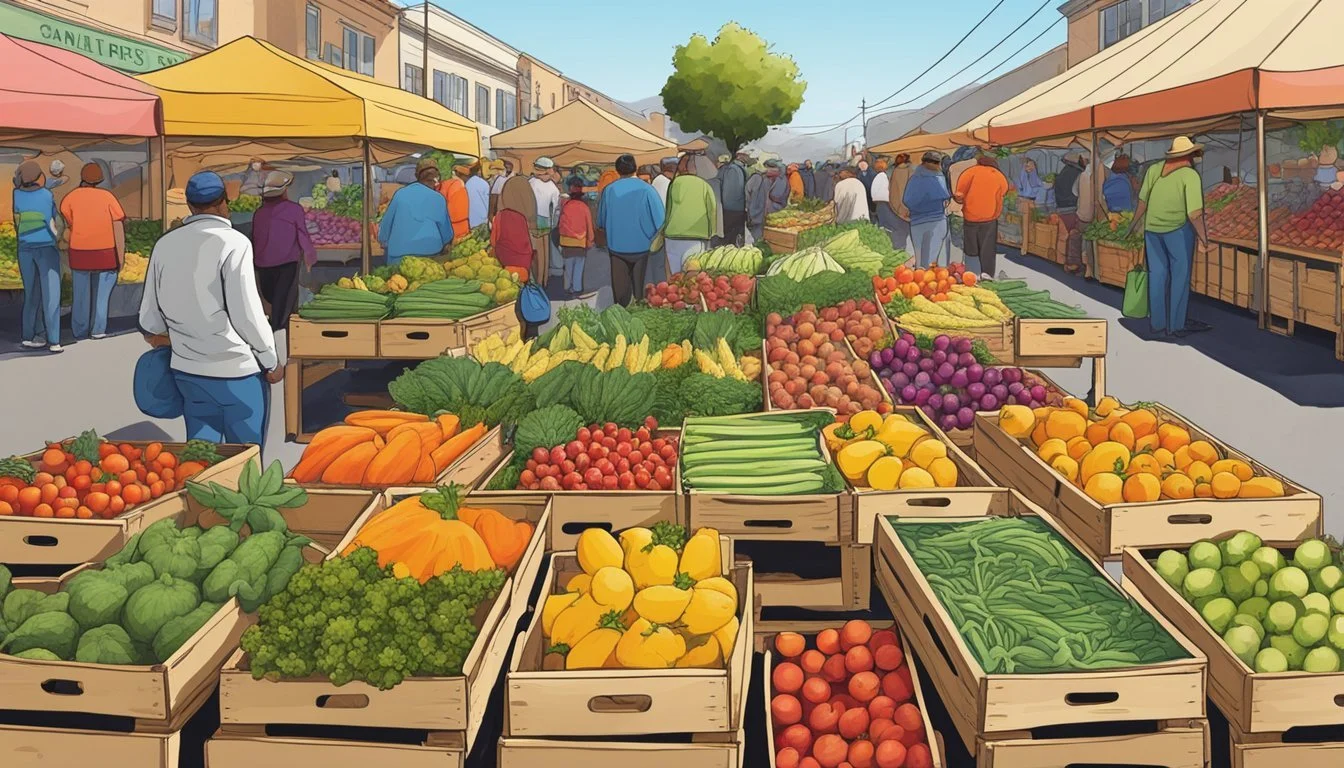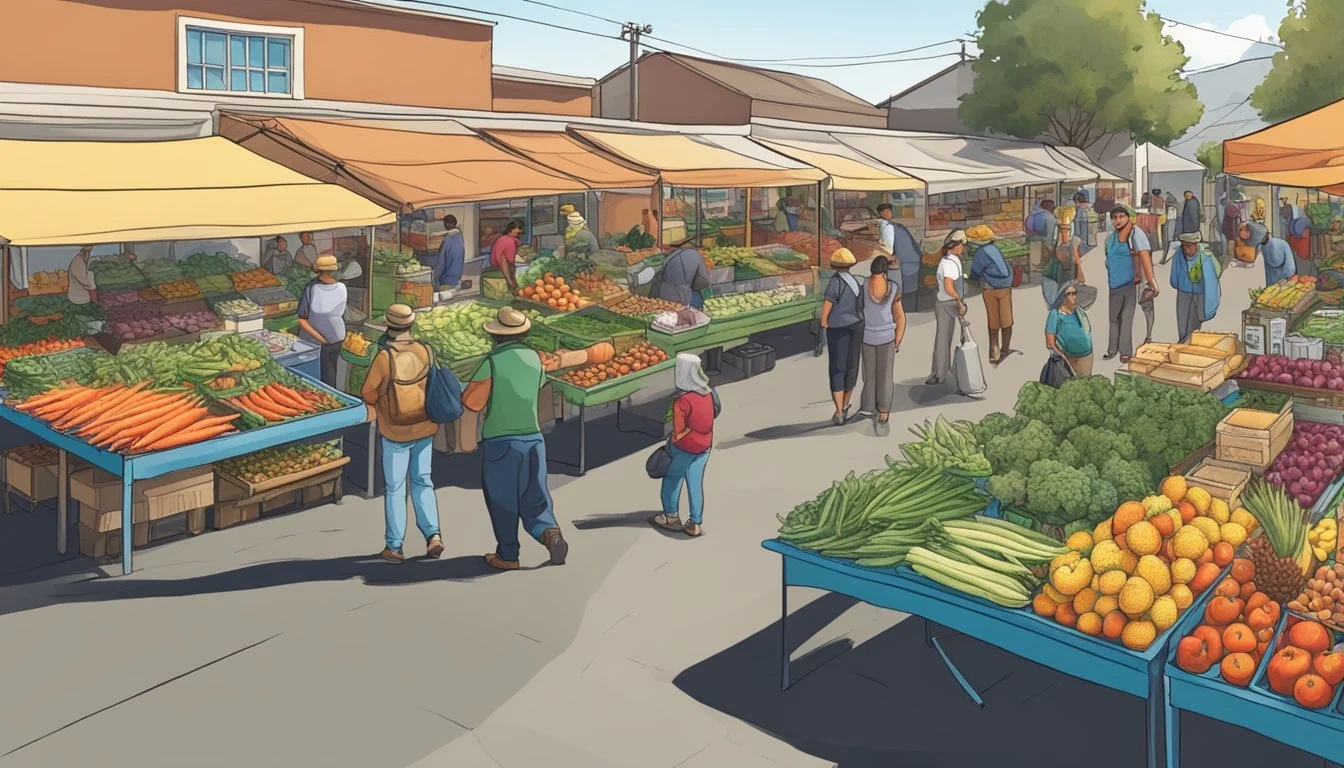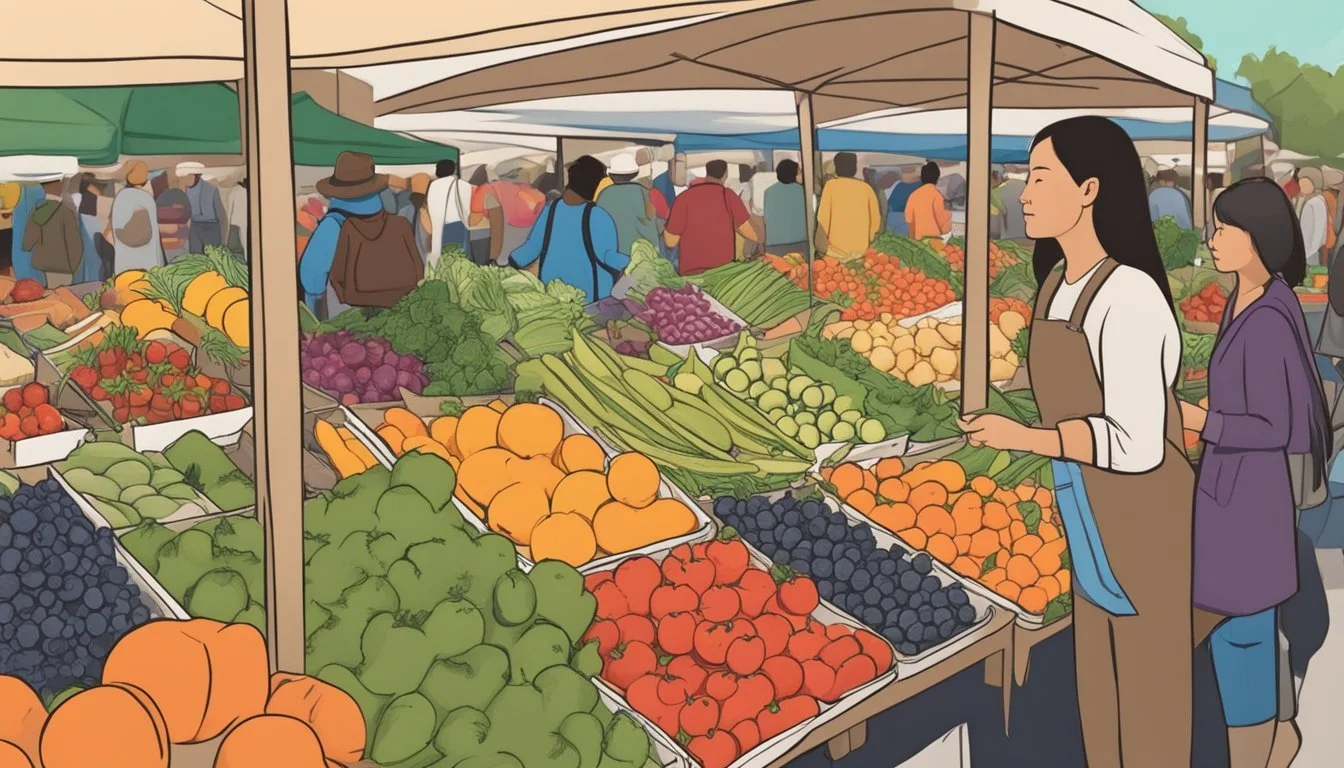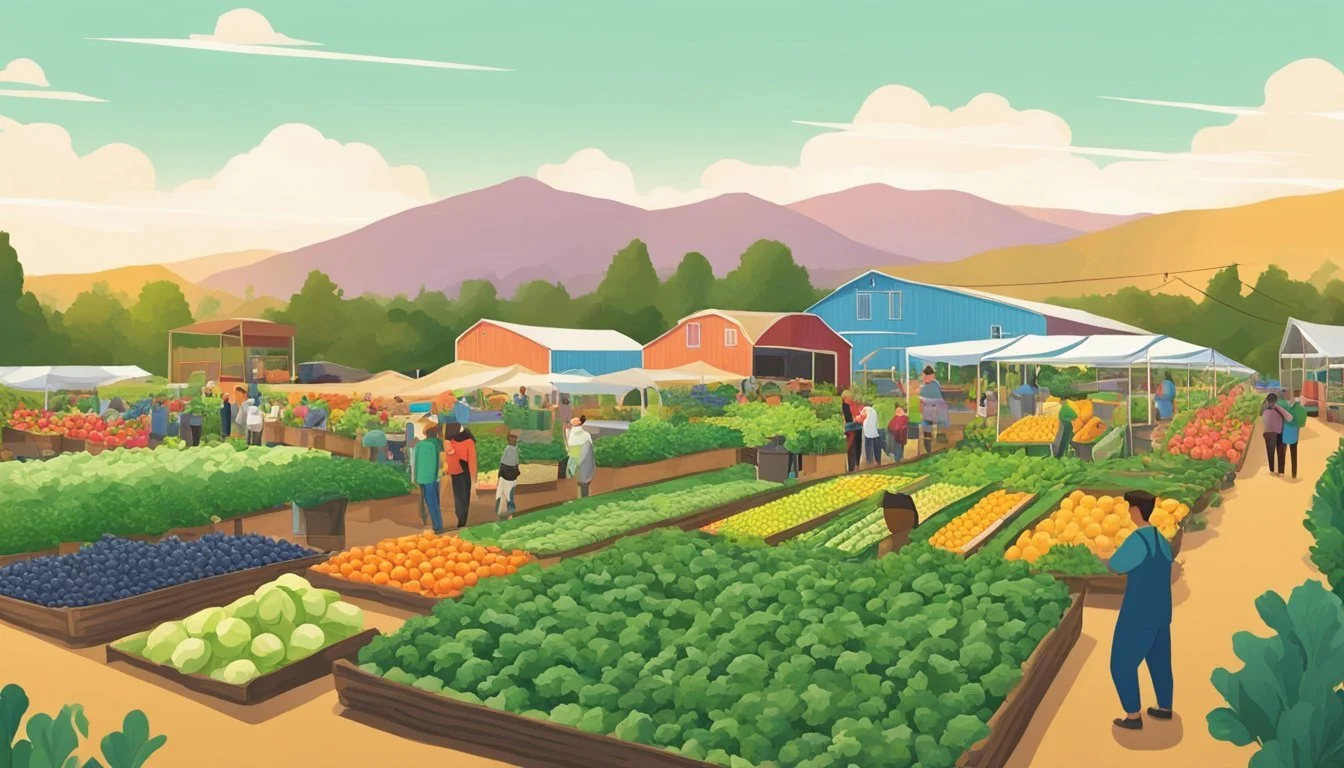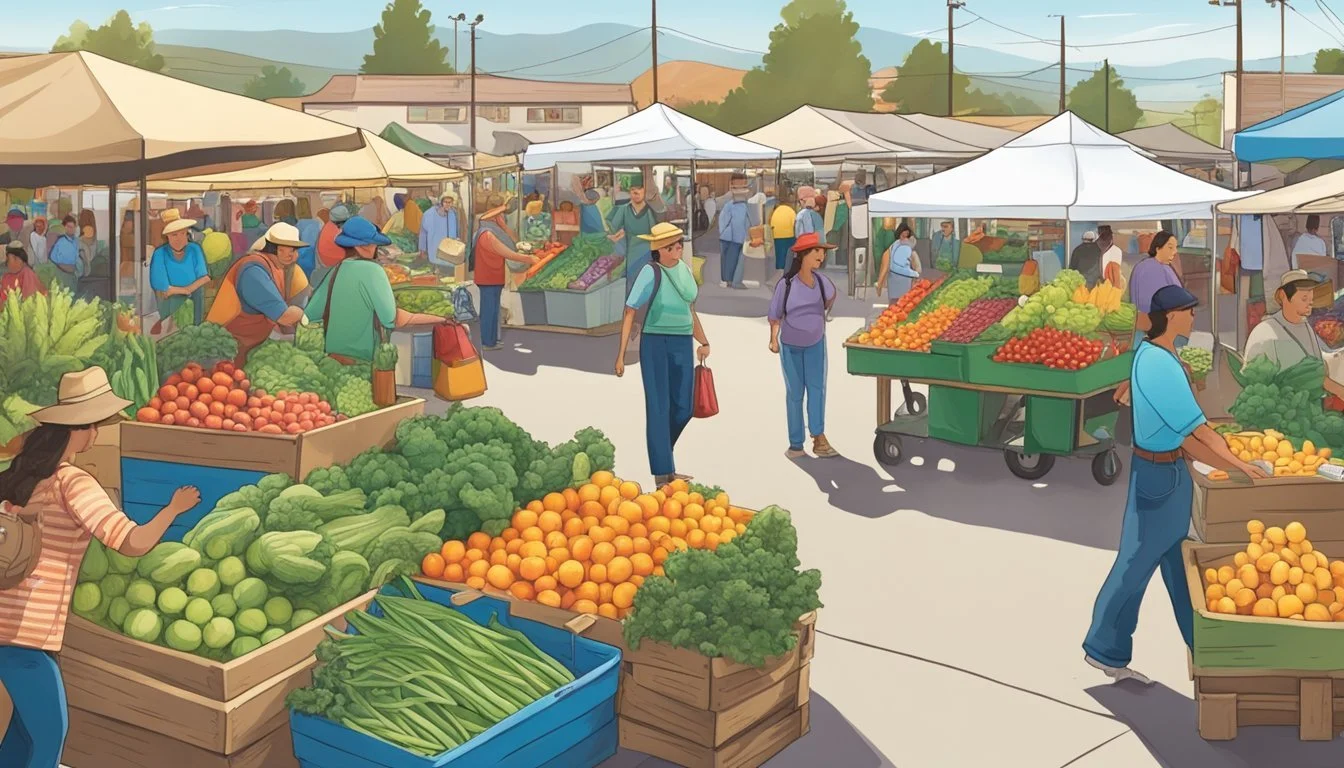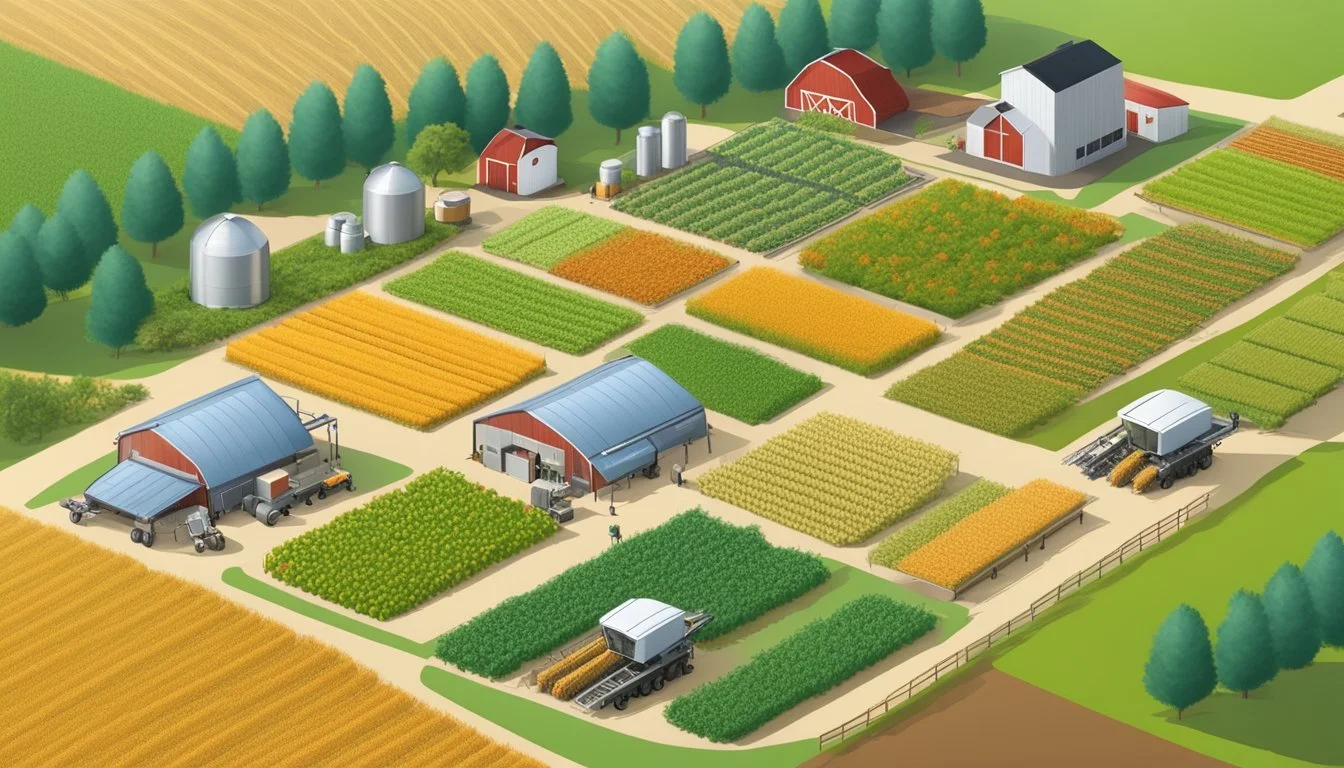Community Supported Agriculture (CSA) in Salinas, CA
A Guide to Local Farm Partnerships
Community Supported Agriculture (CSA) offers a model of food production and distribution that directly connects farmers and consumers within the Salinas, California region. Under this arrangement, individuals and families become members or 'shareholders' of a local farm, providing upfront investment in a season's harvest and receiving a regular allocation of fresh, seasonally available produce. This system fosters a symbiotic relationship where consumers gain access to nutritious, locally-grown food, while enabling farmers to plan their crop sizes with greater certainty and receive better financial stability.
Salinas, with its temperate climate and rich agricultural heritage, is a fertile ground for the CSA movement. The area's farms are known for producing a diverse array of organic fruits and vegetables that reflect not only the seasons but also the cultural preference of this dynamic community. These farms often deliver their produce directly to subscribers' doors or arrange convenient pick-up locations within the area.
By adopting the CSA model, Salinas community members play a pivotal role in supporting local agriculture, ensuring the continuity of healthy eating practices, and reinforcing the region's food security. Moreover, this engagement helps to preserve the essential agricultural character of Salinas, promoting sustainability and reinforcing the bond between the land and its inhabitants. Through CSAs, the Salinas community embraces a form of economic and environmental stewardship that enriches both its residents and the surrounding farmland.
History of CSA in Salinas
In Salinas, California, a city known for its abundant produce and often called the "Salad Bowl of the World," the principles of Community Supported Agriculture (CSA) resonate deeply with local farmers and consumers. CSA in Salinas is a reflection of a broader movement within California that values sustainable, organic farming and direct-to-consumer sales.
Community Supported Agriculture gained traction within Salinas as residents sought fresher, organic produce and a closer relationship with the people growing their food. It provided an opportunity for local farmers to ensure a market for their crops, and for the community to receive high-quality produce.
Local farms, small and family-owned, began adopting the CSA model, offering subscriptions to residents. Each subscription directly supports the operations of the farm, and in return, consumers receive seasonal produce, fostering a symbiotic relationship between consumers and growers.
California's rich agricultural history has helped CSAs in Salinas flourish through support for local farming. As consumers became more conscious of the impacts of their food choices, the demand for CSA shares increased, enabling farmers to maintain and expand their operations while adhering to sustainable practices.
CSAs and Salinas:
Enhance local economic sustainability
Support organic and sustainable farming practices
Strengthen the relationship between consumers and farmers
Inhabitants of Salinas continue to participate in CSA programs, which have become an integral part of local farming and the community's approach to food consumption. With each season, CSAs in Salinas connect people to the land and to the hands that cultivate it, ensuring the longevity of the city's agricultural heritage and bolstering a community-centric food system.
Understanding CSA Models
Community Supported Agriculture (CSA) in Salinas, CA, offers individuals an opportunity to subscribe to fresh, seasonal produce through various models. Consumers can choose a suitable structure based on their preference for variety and flexibility.
Subscription-Based CSAs
In a subscription-based CSA model, members pay in advance for a season's worth of produce. They normally receive a fixed assortment of seasonal produce each week, curated by the farmer. This method simplifies decision-making for consumers, as they trust the farmer to select the best of what's available. It's a direct way to invest in local agriculture and reap the benefits of fresh, varied offerings throughout the farm season.
Benefits Details Predictability Fixed varieties of produce each week Community Connection Direct support and relationship building with local farmers Seasonal Eating Consumption of produce at the peak of its freshness and taste
Market-Style CSAs
Alternatively, market-style CSAs provide members with more flexibility. Members receive a certain number of "credits" that they can use at the CSA's market stand or designated pick-up points. This model allows them to select their preferred variety of seasonal produce, akin to shopping at a farmers' market with the added benefit of membership in the CSA community.
Benefits Details Flexibility Choose produce based on personal preference each time Direct Market Experience Consumer involvement in selecting their produce Support through Membership Continuous support for farmers with the assurance of sales
Both models aim to connect consumers directly with their local food system, providing them access to fresh, quality produce while supporting Salinas farmers’ livelihoods and the community’s sustainability.
Benefits of Joining a CSA
Joining a Community Supported Agriculture (CSA) program in Salinas, CA, provides community members with a host of advantages, from enjoying fresh local produce to supporting sustainable agriculture. These benefits not only promote personal health and nutrition but also bolster the local economy and reduce environmental impacts.
Freshness and Variety
CSA members in Salinas, CA receive farm-fresh produce that is often harvested within a day of pick-up or delivery, ensuring the highest level of freshness. This proximity to the source also allows for an impressive variety of fruits and vegetables. CSA participants typically enjoy a selection of seasonal produce that may include unique or heirloom varieties not commonly found in supermarkets.
Fresh Produce: Harvested at peak ripeness, providing optimal flavor and nutritional value.
Seasonal Variety: Weekly shares often include a mix of staples and unique items, encouraging culinary exploration.
Health and Nutrition
As consumers become increasingly interested in healthy eating, CSAs can play a substantial role. They offer organic produce, which is grown without synthetic pesticides and fertilizers, providing a cleaner choice for the consumer's diet. This focus on health and nutrition helps in cultivating a community aware of the benefits of eating whole, unprocessed foods directly from the farm.
Organic Produce: Supports a clean and nutritious diet.
Whole Foods: Encourages consumption of whole, unmodified foods abundant in essential nutrients.
Supporting Local Economy
One of the most direct benefits of a CSA is its positive effect on the local economy. Funds from CSA memberships go straight into the pockets of local farmers, ensuring they receive fair compensation for their labor. This helps small-scale farms sustain their operations and contributes to the economic vitality of the Salinas area.
Direct Support: Members' fees directly support farm operations and local businesses.
Local Economy: Strengthens economic ties within the community and encourages regional prosperity.
Environmental Impact
CSAs in Salinas are at the forefront of reducing the environmental footprint of food production and distribution. By sourcing locally, the distance food travels from farm to table is drastically reduced, resulting in lower carbon emissions. Additionally, many CSAs in the region practice sustainable farming methods, such as water conservation and organic practices, which are gentler on the earth.
Reduced Food Miles: Lower carbon footprint due to minimal transportation requirements.
Sustainable Practices: Adoption of eco-friendly farming methods that promote biodiversity and soil health.
How CSAs Work
Community-Supported Agriculture (CSA) is a model in which consumers buy shares from local farmers in exchange for a portion of the harvest. This system fosters a direct partnership between farmers and members, ensuring fresh, seasonal produce is delivered regularly.
Seasonal Schedule
CSA programs are structured around the farming season. Members subscribe in advance, and in return, they receive weekly or bi-weekly shares of the harvest throughout the growing season. The content of these shares varies with seasonal availability, promoting a diet that is in harmony with the natural production cycle.
Share Types
Shares in a CSA can vary, often allowing members a degree of customization. A typical configuration is as follows:
Full Share: Suitable for families, it includes a wider variety of produce.
Half Share: A smaller option for individuals or couples.
Some CSAs also provide options for add-on items like eggs, dairy, and meat, when available from the farm or partner farms.
Payment and Membership
Membership in a CSA involves paying for the entire season’s subscription upfront or through a payment plan. This model provides the farmer with the necessary capital at the start of the growing season. Subscription costs can vary based on share size and the variety of produce provided. Some CSAs also offer discounted rates for volunteer work or low-income members to foster inclusivity and community support.
Challenges Faced by CSA Farms
Community Supported Agriculture (CSA) farms in Salinas, CA are not exempt from encountering difficult hurdles. These farms grapple with a range of challenges from internal operational issues to external market forces that directly impact their sustainability and growth.
Operational Challenges
Labor Management: CSA farms often experience labor shortages due in part to the strenuous nature of farm work and competition for workers from larger agricultural operations. Securing a reliable workforce is a constant challenge for farmers.
Supply Chain Inefficiencies: Managing a supply chain from farm to consumer requires efficient logistics. CSA farmers must coordinate planting schedules, harvesting, packaging, and distribution, which can be complicated by limited resources.
Weather Dependence
Climatic Variability: Farms are inherently subject to weather changes. In Salinas, unpredictable weather can wreak havoc on crop yields. The reliance on favorable conditions makes CSA farms vulnerable to losses from adverse weather events.
Drought: Salinas, being in California, faces periodic drought conditions. Water scarcity directly impacts irrigation, leading to reduced outputs and increased costs for farms.
Market Competition
Competition with Big Agriculture: CSA farms compete with large-scale agricultural enterprises that often have more resources, including sophisticated marketing strategies and lower prices due to economies of scale.
Consumer Preference Shifts: These farms must remain attuned to consumer preferences, which can be quite volatile. A CSA market manager has the intricate task of responding to these shifts while maintaining the farm's identity and principles.
CSA Farming Practices
Community Supported Agriculture (CSA) in Salinas, California, incorporates a variety of ecologically responsible farming practices. The emphasis is on organic and sustainable techniques, soil management, and crop rotation to maintain healthy farmlands and produce quality crops.
Organic and Sustainable Farming
CSAs in Salinas adopt organic farming methods, growing produce without synthetic pesticides, herbicides, or fertilizers. These practices ensure that the food is not only safe for consumption but also beneficial for the environment. Many CSAs are Certified Organic by the USDA, which mandates strict adherence to organic standards.
Certification: USDA Certified Organic
Non-Use of Synthetic Substances: No synthetic pesticides, herbicides, or fertilizers
Soil Management
Effective soil management is crucial for the productivity of CSA farmlands. Farmers in Salinas focus on enhancing soil fertility naturally through the use of compost, green manure, and organic mulch. This not only enriches the soil but also helps in water retention and prevents soil erosion.
Key Practices:
Composting organic waste
Utilization of green manures
Application of organic mulches for moisture retention
Crop Rotation
Crop rotation is a strategic component in Salinas' CSAs, allowing the land to replenish and reducing the risk of soil-borne diseases. By rotating crops seasonally, farmers prevent the depletion of specific soil nutrients and disrupt the cycle of pests.
Examples of Crop Rotation:
Legumes to add nitrogen to the soil
Leafy greens followed by root vegetables
Different crops are planted in sequential seasons, promoting biodiversity and ecological harmony on the farm.
Community and CSA Partnerships
Salinas, California's CSAs foster strong bonds between local farms and the community, underscoring the importance of mutual support and shared agricultural responsibilities.
Building Customer Relationships
Community Supported Agriculture (CSA) models in Salinas prioritize direct interaction between farmers and consumers. Local farms like Live Earth Farm utilize the CSA model to cultivate personal relationships, establishing trust and long-term commitment from members who choose to support them. Customers become integral as they invest in the farm's produce upfront, reinforcing a foundation of reliable patronage.
Educational Opportunities
Through partnership with organizations such as the CSA Innovation Network, educational opportunities arise. Farms open their gates for tours, workshops, and hands-on experiences, providing tangible insights into organic farming and local food systems. This engagement serves as both an educational platform and a means to strengthen the sense of community.
Community Events
Community events serve as a platform for CSA members to engage with one another and with the farmers, forming a cohesive community around food and sustainability. Farms hosting seasonal events and potlucks nurture a shared identity and join people in celebration of local harvests, further bonding the community to its agricultural roots.
Impact on Local Food Supply
Community Supported Agriculture (CSA) plays a pivotal role in reinforcing the local food supply in Salinas, California. By establishing direct connections between producers and consumers, CSAs contribute significantly to the availability and distribution of fresh, organic produce.
Local Food Networks: CSA initiatives in Salinas have catalyzed the formation of robust local food networks. These networks not only facilitate the movement of produce from farms to families but also foster community engagement and support local farm sustainability.
Advantages for Families: By joining a CSA, families receive a regular supply of seasonal produce. This not only ensures freshness and quality but also provides an opportunity for families to experiment with new types of produce that they might not typically purchase at conventional outlets.
LocalHarvest Resources: LocalHarvest, an online platform, lists numerous CSA options for Salinas residents. This resource simplifies the discovery of local CSAs, connecting families directly with farms like Live Earth Farm, which has been serving the community since 1995.
CSAs in Salinas, CA Benefits Direct access to fresh produce Nutritional advantages Support of local farmers Economic stability Environmental sustainability Reduced carbon footprint
Farming Network Support: The network of organic farms, underpinned by the CSA model, supports sustainable farming practices in the region. Salinas CSAs prioritize ecological and community resilience, ensuring a year-round supply of locally sourced food.
Through these networks and the solidarity of subscriptions, Community Supported Agriculture becomes a cornerstone in maintaining a healthy and resilient local food system in Salinas.
Selecting the Right CSA in Salinas
When choosing a Community Supported Agriculture (CSA) program in Salinas, CA, it's important to consider the farm's practices, product variety, and commitment requirements. These factors will heavily influence members' satisfaction and the retention rates of the CSA.
Assessing CSA Options
In Salinas, prospective CSA members should begin by exploring Local Food Directories to identify a list of nearby CSAs. Key considerations for selection should include:
Location: Proximity to the farm can affect freshness and pickup convenience.
Produce Variety: Farms like Live Earth Farm offer a range of organic foods, which may cater better to members desiring diversity in their diet.
A methodical approach is to compare options with a table:
CSA Name Location Variety Offered Organic Pickup/Delivery Options CSA A Salinas Wide Yes Both CSA B Salinas Moderate No Pickup Only CSA C Nearby Limited Yes Delivery Only
Understanding CSA Terms
Members ought to familiarize themselves with the terms of their subscription. This includes:
Share Types: Some CSAs offer full or half-shares to accommodate different household sizes.
Season Length: The duration in which members receive their weekly produce.
Being knowledgeable about these terms helps in setting the right expectations.
Membership Commitment
The commitment to a Salinas CSA is not just a monetary subscription but a partnership. Members should evaluate:
Payment Schedule: Some CSAs require full payment upfront, aiding farms in planning their seasons, while others may offer payment plans.
Retention Rates: High retention rates can indicate member satisfaction with the CSA's offering and the quality of produce.
Prospective members should consider both their short-term and long-term ability to commit to the CSA program to ensure a mutually beneficial relationship.
CSAs Beyond Vegetables
Community Supported Agriculture (CSA) programs in Salinas, CA, offer a diverse range of products beyond the traditional offerings of fruits and vegetables. Subscribers can anticipate a varied selection including meat, dairy, and additional farm products enhancing their weekly subscription boxes.
Inclusion of Meat and Dairy
CSAs have expanded their shares to include meat and dairy items catering to a complete dietary requirement. When subscribers choose a CSA plan, they often have options for:
Meat: Grass-fed beef, free-range chicken, and pasture-raised pork.
Eggs: Fresh from the farm, often from chickens raised in improved living conditions.
Cheese: Artisanal varieties that may include goat, cow, or sheep cheese from local creameries.
Additional Farm Products
The scope of CSA offerings often encompasses a plethora of non-produce items. Typically, these additional products are available to subscribers:
Flowers and Bouquets: Seasonal flowers fresh from local fields, arranged in bouquets.
Honey: Locally produced, raw honey, sometimes available in limited quantities.
Preserved Goods: Jams, pickles, and other preserved items made from local harvests.
Subscribers of CSAs in Salinas, CA enjoy the convenience and delight of these expanded offerings, supporting their community's agriculture while experiencing the region's rich bounty.
CSA Membership and Community Engagement
Community Supported Agriculture (CSA) represents a partnership between local farmers and their communities. In Salinas, California, a region known for its rich agricultural landscape, CSA members—often individuals and families—purchase shares of a farm's harvest in advance. This economic relationship assists farmers in planning and production, while community members gain access to fresh, seasonal produce.
Becoming a CSA Member
Members typically sign up for a subscription where they receive regular deliveries or pick-ups of produce boxes.
The Role of a Member
Investing: Members fund the farming operations upfront.
Sharing Risks and Rewards: They share in the abundance as well as any potential crop shortcomings.
Benefits for the Community
Access to Fresh Food: Regular supply of fresh, locally grown produce.
Education: Members learn about sustainable agriculture and seasonal eating.
Family Engagement: Families can visit the farm, fostering a deeper understanding of food origins.
Engaging with the Farm
Farms may offer events such as tours, harvest festivals, or picking days, fostering a stronger relationship between members and their local agricultural community.
The Impact on Farmers
Community support :
Reduces marketing costs.
Provides a reliable customer base.
Generates working capital early in the season.
In Salinas, CSA is more than a produce subscription; it’s a commitment to sustaining local agriculture and bolstering community ties. The mutual support between farmers and members exemplifies a true community-farm partnership.
Marketing and Growth Strategies for CSAs
In Salinas, a fertile hub known for its agricultural output, Community Supported Agriculture (CSA) programs are seeking innovative marketing and growth strategies to sustain and expand their customer base and strengthen community relationships.
Leveraging Social Media
Social media serves as a powerful tool for CSAs in Salinas to connect with their community and market their produce. By using platforms like Facebook, Instagram, and Twitter, CSAs can showcase their fresh, locally grown produce, engage customers with harvest updates, and create visually appealing content that resonates with a health-conscious audience. It's essential for these businesses to utilize strategies such as:
Posts featuring high-quality images of their markets and produce
Stories for sharing quick updates and behind-the-scenes peeks into farm life
Hashtags to improve discoverability among local consumers interested in fresh, organic produce
Participation in Local Farmers Markets
Farmers markets are vital for CSAs in Salinas to gain direct exposure and foster personal relationships with customers. Attending these markets not only allows CSAs to sell their products but also to engage intimately with community members. Effective methods to capitalize on farmers market participation include:
Offering samples to entice potential CSA members
Providing detailed information about CSA subscription benefits
Displaying eye-catching signage and banners that promote the CSA and its unique selling points
Community Outreach Programs
CSAs can further their growth by initiating community outreach programs that emphasize education, collaboration, and inclusivity. They can organize local events, workshops, and school programs to educate the community on the importance of supporting local agriculture and the benefits of consuming seasonal produce. Implementing these approaches helps strengthen community ties and bolsters CSA membership:
Host seasonal farm-to-table events to demonstrate the quality and variety of the CSA's offerings
Collaborate with local businesses and organizations to promote the CSA and create co-marketing opportunities
Sponsor educational programs that align with community values and interests in sustainable food systems
Technological Advancements in CSA Management
Community Supported Agriculture (CSA) management in Salinas, CA, is evolving rapidly with the integration of advanced technology, encompassing specialized software, comprehensive data analytics, and dynamic online communication platforms. These technological tools are essential for streamlining operations, enhancing member engagement, and optimizing agricultural output.
CSA Software Solutions
CSA managers in Salinas leverage state-of-the-art software solutions to automate and coordinate farm activities. This technology allows for real-time crop management, member subscriptions, and payment processing. For example, software platforms such as HarvestHand and Farmigo offer features such as:
Customer Relationship Management (CRM)
Inventory tracking
Distribution logistics
These software systems often include API integrations, enabling seamless connections with other digital tools used in the CSA ecosystem.
Data and Analytics
Data collection and analytics are critical in understanding and predicting consumer trends, crop yields, and financial performance. CSA managers employ analytics software to process vast amounts of data, generating actionable insights. Key areas of focus include:
Member retention rates
Crop yield predictions
Market demand analysis
Accurate analysis can help CSAs adjust their planting schedules and improve harvest efficiency, resulting in better resource allocation and reduced waste.
Online Communication Platforms
Salinas CSAs utilize online communication platforms to maintain a strong connection with their community. These platforms facilitate a two-way dialogue where producers and consumers can interact directly. Examples include:
Social media groups
Email newsletters
Customized CSA member portals
Through these digital channels, CSAs efficiently share updates, receive feedback, and foster a sense of belonging among members. Efficient communication is integral to sustaining the vitality of the CSA model in today's tech-centric world.
Legal and Regulatory Aspects
In Salinas, CA, Community Supported Agriculture programs must navigate a variety of legal and regulatory obligations. From food safety to organic certification and business licensing, each area encompasses specific requirements that are critical for lawful and effective operation.
Food Safety Regulations
CSA programs are subject to food safety regulations to ensure the well-being of their customers. In Salinas, producers need to comply with the California Health and Safety Code as well as federal regulations under the Food Safety Modernization Act (FSMA). They must implement preventive controls and may be required to follow the Produce Safety Rule, which sets standards for the growing, harvesting, packing, and holding of produce.
Key Safety Components:
Water quality testing
Employee hygiene training
Soil amendment monitoring
Organic Certification
For a CSA to be labeled as "Certified Organic" in Salinas, it must meet the United States Department of Agriculture (USDA) National Organic Program (NOP) standards. Certification requires rigorous adherence to organic practices and periodic inspections.
Certification Steps:
Application submission with Organic System Plan
On-site inspection
Compliance review and certification decision
Maintenance:
Annual inspections
Record-keeping for at least five years
Business Licensing
CSAs in Salinas, like any other business entity, need the appropriate business licenses and permits. Salinas requires a Business License Tax Certificate, and depending on operations, may also require state-level permits.
Business Licensing Checklist:
Obtain a Business License Tax Certificate from the City of Salinas
Check for additional permits, possibly for agritourism or on-farm events
They should consult resources like the Legally Resilient Community Supported Agriculture (CSA) Program Guide to help navigate the complexities of laws that affect direct-to-consumer sales, worker employment, and farm event planning. It is also recommended to seek advice from local county offices or the Small and Organic Farm Advisor at ucanr.edu for localized information and guidance. Compliance with legal requirements not only protects the business but also builds trust with consumers.
Future Outlook for CSA in Salinas
The Salinas Valley, known as the "Salad Bowl of the World," stands at the forefront of combining its agricultural heritage with emerging innovations, suggesting a promising future for its Community Supported Agriculture (CSA) operations.
Predictions and Trends
Market Growth: Economic forecasts indicate potential growth in CSA membership within Salinas, as consumers increasingly prioritize fresh, locally-sourced produce. This trend aligns with broader shifts towards more sustainable and community-oriented food systems.
Consumer Base: Data point towards a diversification of CSA subscribers in Salinas. Traditionally dominated by white, educated, middle- and upper-class demographics, there is a trend of CSA's appeal broadening to encompass a more varied member base.
Innovations in Local Agriculture
Technological Advancements: Salinas Valley's integration of Silicon Valley's technology with local farming—a synergy of two Californian economic powerhouses—suggests that CSA operations may benefit from technological innovations such as data analytics for crop optimization and advanced distribution systems.
CSA Innovation Network: The establishment and growth of a CSA Innovation Network could provide Salinas local farms with new strategies for crop diversity, resource sharing, and direct marketing techniques, ensuring a stronger, more resilient local food system.



